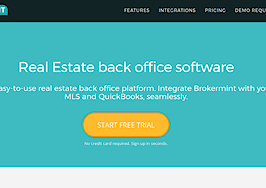SAN FRANCISCO — When you see something weird or broken in the world, you have two choices: wait for someone else to fix it or fix it yourself.
That’s according to John Collison, 27-year-old Irishman and founder of online payment processor Stripe. The young entrepreneur took the stage with Brad Inman at Inman Connect San Francisco to delve into the future of real estate and the internet.

John Collison
Collison started Stripe at age 19 after trying to sell software as a service and finding that accepting payments was tough.
He dropped out of Harvard; partnered with his brother, Patrick; and moved to Silicon Valley to be closer to his customers. Stripe now works in 25 different countries and serves hundreds of thousands of people around the world. Both brothers are billionaires.
On dropping out of college as a common path for entrepreneurs (think Facebook’s Mark Zuckerberg), Collison said, “A lot of entrepreneurs have impatience around the problems they run into. [They’re] driven by deep dissatisfaction with the way the world works right now [and] want to start working on it now.”
Growing the online world
What keeps him going? His answer could have profound implications for real estate.
“We talk about Stripe’s mission as increasing the GDP of the internet,” Collison said.
“People don’t realize this, but most online commerce hasn’t happened yet. That sounds odd to say in 2017, but it’s really true. Less than 5 percent of consumer spending happens online today.
“It means there are a lot of people here in this audience who are taking old, boring, broken, offline processes and moving them into the online world. We find that idea of helping the online economy grow really exciting. And we think that’s a really worthwhile thing to be working on.”
Most of the work of digitizing everything around us and bringing transactions to the online economy has yet to be done, according to Collison.
“I think that brings us to a much better place where you have more cross-border commerce, where it’s easier for entrepreneurs to start businesses,” he said.
And moving online means that the potential audience of a business is much larger, he added.
“You’re no longer dealing with a local market or a regional market. There’s an international audience available to you. You don’t run out of things to do in working on that,” he said.
He finds the rise of what he calls “micro-multinational companies” really exciting.
The term refers to “the idea that you can be a two-person startup and you can be trading all over the world,” Collison said.
“The term multinational evokes giant office parks and skyscrapers and stuff like that, whereas we see all the time now businesses [where] it’s a handful of entrepreneurs in the room, they have an idea, they have a product that’s better” and an international audience.
Digitizing real estate
Some companies have spent decades building networks in the offline world — think Re/Max, Century 21, Keller Williams or any other franchisor — but that doesn’t mean that the winners in the offline world will be able to successfully make the jump into the online world, Collison said.
And some startup that hasn’t put in those decades of work and has zero network to begin with could use its product as a “wedge” to quickly build a self-sustaining network, according to Collison. He used Stripe customer and rental management firm Cozy as an example.
“Cozy allows people to manage their rentals, and one of the things they do in particular is they handle the rental payments for landlords and renters,” he said.
By facilitating those payments online, Cozy got 100,000 rental properties under management with no marketing expense, just word of mouth.
“You can, by virtue of building a better product, get to a giant scale for free in a way that I think wasn’t as possible or certainly as easy in the offline world,” Collison said.
He’s excited to see what the products will look like in the next 10 years for industries, such as real estate, that are in the process of being digitized.
While the process of closing on a home is still a painful one, Collison sees the industry gradually making progress. He remembered the process of renting an apartment when he first came to the U.S. for college as “miserable.”
“It’s easy to look at it [now] and think that we haven’t made progress, but if you contrast it with 10 years ago, we’re way further along than we were before and so I think this stuff will get better,” Collison said.












